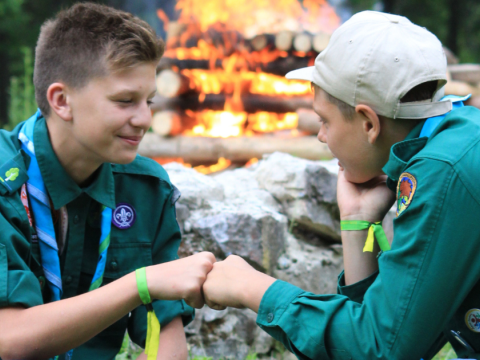New Study in Estonia: Scouting Increases Happiness, Gives Youth Solid Base for Future

Last September, the University of Tartu, Estonia, released the results of a study that measured how the activities of the Estonian Scout Association influence youth development. The survey found that Scouts and their parents credit Scouting for helping to develop skill sets that are needed in the current and the future job market.
Scouting was found to have a positive influence on self-development, self-efficacy and acquisition of knowledge as well as valuable skills needed later in life such as cross-cultural competency, creativity, adaptive ability and a design mindset.
The leader of the research team, University of Tartu Associate Professor of General Sociology Kairi Kasearu, said that based on the views and perceptions of the research subjects, Scouting was perceived to have a positive influence on the development of young people’s personalities and acquisition of social and practical skills.
According to Reelika Ojakivi, head of the Youth Affairs Department at the Estonian Ministry of Education and Research, youth organisations have an important role:
“Scouting develops skills that are beneficial for the future, and makes young people more self-confident and happier”.
The question that led to the research was whether the Scouting organization’s methodological approach also fulfils its goal in practice. Kristjan Pomm, the Estonian Scout Association-side study coordinator and a former Chief Scout of Estonian Scout Association, pointed out that the findings confirmed that the influence of Scouting on youth development was positive across the board.
“Youth organisations that are able to offer young people extracurricular activities with goals that are educational in the broadest sense and are led by adult supervisors are optimally poised to create positive change in the young person’s development " said Kristjan Pomm.
“Also important is the fact that participation in Scouting develops cooperation and functional interaction with others, encourages contribution to various community activities, broadens the understanding of the world and opens up possibilities for finding one’s place and realizing one’s potential in future” he added.
The Estonian Scout Association is the first youth organization in Estonia whose influence on youth development has been evaluated by researchers. Methodologies used for studies conducted for the same purpose in the United Kingdom and by the World Organization of the Scouting Movement, were useful in planning the Estonian study.
The more than century-old Scouting movement appears to be well aligned with the latest views of youth development principles and these results should confirm once again how Scouting still remains relevant and up to date in our society.
Photo credit: Lauri Lindoja